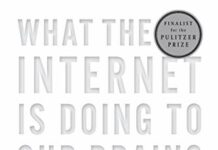
Ebook Info
- Published:
- Number of pages:
- Format: Epub
- File Size: 0.27 MB
- Authors: Nicholas Carr
Description
Finalist for the 2011 Pulitzer Prize in General Nonfiction: “Nicholas Carr has written a Silent Spring for the literary mind.”―Michael Agger, Slate “Is Google making us stupid?” When Nicholas Carr posed that question, in a celebrated Atlantic Monthly cover story, he tapped into a well of anxiety about how the Internet is changing us. He also crystallized one of the most important debates of our time: As we enjoy the Net’s bounties, are we sacrificing our ability to read and think deeply? Now, Carr expands his argument into the most compelling exploration of the Internet’s intellectual and cultural consequences yet published. As he describes how human thought has been shaped through the centuries by “tools of the mind”―from the alphabet to maps, to the printing press, the clock, and the computer―Carr interweaves a fascinating account of recent discoveries in neuroscience by such pioneers as Michael Merzenich and Eric Kandel. Our brains, the historical and scientific evidence reveals, change in response to our experiences. The technologies we use to find, store, and share information can literally reroute our neural pathways. Building on the insights of thinkers from Plato to McLuhan, Carr makes a convincing case that every information technology carries an intellectual ethic―a set of assumptions about the nature of knowledge and intelligence. He explains how the printed book served to focus our attention, promoting deep and creative thought. In stark contrast, the Internet encourages the rapid, distracted sampling of small bits of information from many sources. Its ethic is that of the industrialist, an ethic of speed and efficiency, of optimized production and consumption―and now the Net is remaking us in its own image. We are becoming ever more adept at scanning and skimming, but what we are losing is our capacity for concentration, contemplation, and reflection. Part intellectual history, part popular science, and part cultural criticism, The Shallows sparkles with memorable vignettes―Friedrich Nietzsche wrestling with a typewriter, Sigmund Freud dissecting the brains of sea creatures, Nathaniel Hawthorne contemplating the thunderous approach of a steam locomotive―even as it plumbs profound questions about the state of our modern psyche. This is a book that will forever alter the way we think about media and our minds.
User’s Reviews
Editorial Reviews: Review “A thought provoking exploration of the Internet’s physical and cultural consequences, rendering highly technical material intelligible to the general reader.” ― The 2011 Pulitzer Prize Committee”A must-read for any desk jockey concerned about the Web’s deleterious effects on the mind.” ― Newsweek”Starred Review. Carr provides a deep, enlightening examination of how the Internet influences the brain and its neural pathways. Carr’s analysis incorporates a wealth of neuroscience and other research, as well as philosophy, science, history and cultural developments … His fantastic investigation of the effect of the Internet on our neurological selves concludes with a very humanistic petition for balancing our human and computer interactions … Highly recommended.” ― Library Journal”This is a measured manifesto. Even as Carr bemoans his vanishing attention span, he’s careful to note the usefulness of the Internet, which provides us with access to a near infinitude of information. We might be consigned to the intellectual shallows, but these shallows are as wide as a vast ocean.” ― Jonah Lehrer, The New York Times Book Review”This is a lovely story well told―an ode to a quieter, less frenetic time when reading was more than skimming and thought was more than mere recitation.” ― San Francisco Chronicle”The Shallows isn’t McLuhan’s Understanding Media, but the curiosity rather than trepidation with which Carr reports on the effects of online culture pulls him well into line with his predecessor . . . Carr’s ability to crosscut between cognitive studies involving monkeys and eerily prescient prefigurations of the modern computer opens a line of inquiry into the relationship between human and technology.” ― Ellen Wernecke,, The Onion A.V. Club”The subtitle of Nicholas Carr’s The Shallows: What the Internet is Doing to Our Brains leads one to expect a polemic in the tradition of those published in the 1950s about how rock ’n’ roll was corrupting the nation’s youth … But this is no such book. It is a patient and rewarding popularization of some of the research being done at the frontiers of brain science … Mild-mannered, never polemical, with nothing of the Luddite about him, Carr makes his points with a lot of apt citations and wide-ranging erudition.” ― Christopher Caldwell, Financial Times”Nicholas Carr has written an important and timely book. See if you can stay off the web long enough to read it!” ― Elizabeth Kolbert, author of Field Notes from a Catastrophe: Man, Nature, and Climate Change”Neither a tub-thumpingly alarmist jeremiad nor a breathlessly Panglossian ode to the digital self, Nicholas Carr’s The Shallows is a deeply thoughtful, surprising exploration of our “frenzied” psyches in the age of the Internet. Whether you do it in pixels or pages, read this book.” ― Tom Vanderbilt, author, Traffic: Why We Drive the Way We Do (and What It Says About Us)”Nicholas Carr carefully examines the most important topic in contemporary culture―the mental and social transformation created by our new electronic environment. Without ever losing sight of the larger questions at stake, he calmly demolishes the clichés that have dominated discussions about the Internet. Witty, ambitious, and immensely readable, The Shallows actually manages to describe the weird, new, artificial world in which we now live.” ― Dana Gioia, poet and former Chairman of the National Endowment for the Arts”The core of education is this: developing the capacity to concentrate. The fruits of this capacity we call civilization. But all that is finished, perhaps. Welcome to the shallows, where the un-educating of homo sapiens begins. Nicholas Carr does a wonderful job synthesizing the recent cognitive research. In doing so, he gently refutes the ideologists of progress, and shows what is really at stake in the daily habits of our wired lives: the re-constitution of our minds. What emerges for the reader, inexorably, is the suspicion that we have well and truly screwed ourselves.” ― Matthew B. Crawford, author of Shop Class As Soulcraft”Ultimately, The Shallows is a book about the preservation of the human capacity for contemplation and wisdom, in an epoch where both appear increasingly threatened. Nick Carr provides a thought-provoking and intellectually courageous account of how the medium of the Internet is changing the way we think now and how future generations will or will not think. Few works could be more important.” ― Maryanne Wolf, author of Proust and the Squid: The Story and Science of the Reading Brain About the Author Nicholas Carr is the author of The Shallows, a Pulitzer Prize finalist, The Glass Cage, and Utopia is Creepy. He has written for the New York Times, the Wall Street Journal, Atlantic, and Wired. He lives in Massachusetts with his wife.
Reviews from Amazon users which were colected at the time this book was published on the website:
⭐I knew something was wrong when I would post online, waiting for anyone to respond.It becomes this obsession, small bits of human contact, mediated by the computer.”This person likes what you wrote”, digital pats on they back, they become addictive.I am five days clean from reddit.com. I’ve used drugs, no drug I’ve tried is as addictive as social media. The first day my entire body hurt. I just wanted to check my posts, refresh the front page. I knew it would be hard, I didn’t know it would make me suicidal.I kept having these thoughts about missing out. How would I know the absolute latest information about the Las Vegas shooter? Even with a NYTimes subscription I felt left out.The endless conversations, arguments, quips. It feels like a huge extended family.I get why. It amplifies our conversations to make them seem outsized, but no one is really reading. It’s non-stop entertainment. My views were never seriously challenged. Any belief, no matter how strange, a group is waiting to accept you.I want more real life friends and I can tell a reliance on the Internet has stunted my ability to relate to people in the real world.I’m getting over an addiction, now the work of living begins.
⭐This book was originally published in 2010 and has now been republished in 2020. The text largely remains a repeat of what was said in 2010. A short afterword has been added to the end of the 2020 edition in a small effort to bring it up to date. In the fast-moving world of technology, this amounts to totally out of date.The author attempts to excuse this asserting that his original thesis remains correct, but in fact the book is much more historical narrative of the industry than it is an analysis of how technology has affected people. And the analysis that remains from the first edition is was weak to begin with. The book really does not explain a whole lot.Much of the history of the computer industry that it goes over is pre-2010. This is well known to anyone who lived through it, and it’s fairly boring to read about it again. What has happened in the last 10 years is almost entirely omitted. The author’s personal stories are not something everyone really wants to wade through.The book fails on two counts–(1) it should have been totally re-written to bring it up to date and (2) it should contain a much more robust discussion of impact of technology our conscious lives. For example, there’s very little on what Facebook has done to human relations.The author may make some money off re-printing, but the product is not worth the time it takes to read it.
⭐I loved reading, thinking, contemplating and attempting to understand complex concepts as a young man and adult. In the last 10 years that joy steadily declined, and I have become in my mind less able to do what I once loved. I thought it was aging, little did I know. If you love learning and thinking read this book. Carr has made a strong case for limiting our interaction with the WWW because it is transforming us into computers, not thinkers.
⭐The development of that magnificent resource for the mind, the Internet, has put us at a turning point in human history. The development of all the tools of the mind has provided turning points and in making his case Nicholas Carr takes us through what happened to us when we went from clay to papyrus to paper and from tablets to scrolls to books. With every one of these changes the world shifted some. Not as much as now though.At the same time that the Internet is changing the world, bringing us closer together around masses of information, it is changing our ability to think and it is changing our brains in dangerous ways. The issue is not the content of the Internet, but its process.The human adapts to its tools and its tasks. Give a man a hammer for a lifetime’s work and his body shapes to effectively drive nails. Take away his pen and give him a typewriter with a ball and his prose turns from fluid to staccato. (That happened to Nietzsche in the late nineteenth century.) In that process of adaption the brain, since it is not a machine but an organ, changes. These changes can be seen with instruments and their results observed in human behavior. This is the world of Nicholas Carr. I will describe a tiny fraction of what the Internet is doing to our brains.1) The brain, confronted with a glowing screen and the ability to hypertext its way from one interruption to another across the universe of knowledge from what its buddy in Australia thinks of rutabagas, to the spelling of rutabagas to the history of rutabagas to dishes that can be prepared from rutabagas leaves the brain sliding from one fact of surface interest to another fact even less useful, until it occurs to the brain to pursue the prompt on the pop-up menu and check the weather and get off of this slide onto the weather channel where a five minute video on playful seals on San Francisco Bay can be watched for free which does remind the brain that it could slide over to Facebook and find out if anyone “liked” the picture of the family cat posted an hour ago. And many do. Twenty-three “likes,” praise the Lord.Just as the carpenter’s arm grew it muscles to deal effectively with the hammer the brain changes to succeed in a slippy slidey world of itty bitty bits of knowledge intended to interest momentarily and then disappear.So what will happen when it confronts a life choice? Will this passive instrument skidding from meaningless bit to another meaningless bit see itself suddenly as an agent? A “decider?” Or will it in panic seek the next button to push, even if that button bears the label “Self Destruct?”According to Time magazine this is happening now in the Silicon Valley high schools; kids depressed and without a sense of agency pushed around by the ripples on the surface of the Internet are choosing to leave life. Rutabagas have lost their interest. Having your cat liked did not fill the hole intended for having yourself loved. And this child is not accustomed to doing things about things. This child does not do. This child is done to. With the same alacrity that he or she pursued the prompt to watch the seals he or she may “decide” it is time to end this.2) I discovered my wife of the last forty-three years with whom I have raised two children and now five grandchildren with much happiness when while sitting on her front lawn, I seriously told her my goals in life. She thought they were so funny she actually rolled over laughing. If I had instituted a computer search what algorithm would have found her an appropriate match? Yet this brain of mine sorted through whatever book-formed channels it had and locked in immediately on her as the “one,” the antidote to the man who takes himself too seriously. The Internet would have provided me many potential companions, each more serious than the last. That is the way it works. It finds my interests and then adds to the pile. If I follow its suggestions I become narrower and narrower, a better candidate to respond to the advertisers, a defined target, and a wealth of possibilities pass me by.3) For something to remain in long-term memory it must spend two hours in short term memory. (There is actually a tiny physical growth that must happen.) But on the trip through rutabaga land, things go in and out too quickly to be grafted on the long-term nodules. Of course it still exists in the computer’s memory. When you know you need it, it can be sought. However the advantage of the human memory is that it coughs up stored information when you need it but do not know you need it. Not only does your intellect call on your memory, but your memory initiates conversations with your intellect. You won’t have that ability any longer. And since your long-term memory is not being used the section of the brain devoted to long-term memory has already begun to shrink.Distant memories of your mother’s tears, your father’s embrace, your sisters admiration and your little brother’s needs will be crowded out of the brain, and I doubt if you will find them in Internet land either.4) There are now residential therapy centers to assist the hooked to unhook from the Internet. The Internet lights up the same section of the brain as does cocaine. Didn’t’ know those grade school kids were getting a buzz? Makes what may be happening to my grandchildren a little less cute and a little less funny.Read The Shallows yourself. What I have written is just a corner of the future described there. See if it scares you! And if it does, see who else you can scare with it. Hope they have enough of an attention span left to read the book. (A sign of the times is that people who used to write books no longer can read them. Not enough slippy and slidey. Boring!)Can the majority of us survive without complex and nuanced thought? Without deep and poignant memories? Do we want to?
⭐Lots to think about here for being such a short book.If you’re looking at this, just go for it.It’s a quick read that shouldn’t keep you from your tech for too long. Read it on a Kindle for extra irony.The first half is largely a historical summary of communication and media, with the back half emphasizing the effects on our brains. It was written years ago, so it adds an interesting potency to see the impact today.
⭐Shocking but very interesting study.
⭐Esse livro precisa ser impresso em português o quanto antes! É extremamente essencial para os tempos atuais. Eu li a versão de 2011 em português e esse é exatamente o mesmo, mas com um capítulo a mais no final. Apesar de ter sido escrito em 2007-2009, o conteúdo é atual e alarmante. Nicholas nos mostra, com base em vários estudos, como a internet alterou nossa forma de pensar e agir (assim como outras ferramentas criadas no passado, como o relógio e mapa). Hoje em dia, nosso cérebro tem mais dificuldade em se aprofundar em algo, em se concentrar e em se manter focado por muito tempo. O cérebro acostumou-se com estímulos rápidos e superficiais, graças ao que a internet nos proporciona: acesso a milhões de informações em questão de segundos, de forma muito descomplicada. O último capítulo é mais atualizado e aborda bastante sobre os smartphones e suas implicações na nossa mente. É preocupante, estamos nos tornando mais superficiais e reféns desses aparelhos. Me sinto muito privilegiado em ter absorvido esse conteúdo. Mesmo não tendo inglês fluente, consegui entender grande parte dos textos. Sugiro a leitura a todos, principalmente àqueles que estão preocupados e que notaram que suas mentes estão inquietas e que não conseguem se concentrar por muito tempo.
⭐
⭐Excellent
⭐Given the title of this book, it would be a shame if it were a shallow read itself. Instead, it is challenging, perceptive and informative. I am enjoying it very much.
⭐Perfect! Thank you!
Keywords
Free Download The Shallows: What the Internet Is Doing to Our Brains in Epub format
The Shallows: What the Internet Is Doing to Our Brains Epub Free Download
Download The Shallows: What the Internet Is Doing to Our Brains Epub Free
The Shallows: What the Internet Is Doing to Our Brains Epub Free Download
Download The Shallows: What the Internet Is Doing to Our Brains Epub
Free Download Ebook The Shallows: What the Internet Is Doing to Our Brains





